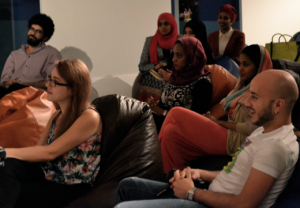Working on a Fulbright-mtvU application for the upcoming February 27 deadline? Attend this week’s webinar on General Q&A this Thursday, January 15, at 2:00 p.m. EST!
In early November, I went to an open mic for local poets at an Abu Dhabi venue called The Space. It was the fourth event in a new Rooftop Rhythms series for Arabic poetry, organized by Rooftops founder Dorian “Paul D” Rogers. The event featured about fifteen poets, who combined elements of Arabic poetry with spoken word. They were multilingual UAE residents from a variety of Arab backgrounds—Palestinian, Lebanese, Emirati, and Sudanese. Many were regulars at Rooftop events but usually performed in English. They reminded the audience of this since the connotations of writing poetry differ from one language to another. Arabic poetry is associated with mastery of Classical Arabic and a deep knowledge of the Arabic literary heritage, while spoken word favors poetic prowess that is grounded in lived experience. But the audience was open-minded, receptive to hearing Arabic poetry in a variety of dialects, registers, and styles. The evening had a warm, familial vibe, with listeners snapping fingers supportively from their bean bag chairs.

Poets and friends at The Space in Abu Dhabi (Photo courtesy of Farah Bushnaq)
I chose a poem to feature here that fits neatly into the themes of this blog. It’s by Dubai-based poet Zeina Hashem Beck, written in appreciation of the performative style of Egyptian singer Umm Kulthum (d. 1975). Umm Kulthum is one of the most beloved figures of the Arab world, and the lyrics to her songs are among the most widely memorized of Arabic poems. Zeina’s poem is called “Umm Kulthum or Al-Intithar [Waiting],” (a title that brought to my mind Umm Kulthum’s famous song, “Ana fi Intizarak” [I’m waiting for you]). Zeina is from Tripoli, Lebanon, and studied English Literature at the American University in Beirut. She is an English-language poet, with her work published and forthcoming in over a dozen literary journals, but considers herself a newcomer to Arabic poetry. Her debut poetry collection, To Live in Autumn (The Backwaters Press, 2014), won the 2013 Backwaters Prize and has been recently released. The poems of this collection describe Beirut as she sees it; a city that resembles autumn in its uncertainties and the conflicted feelings it inspires.
Continue Reading
 Are you a U.S. citizen interested in learning more about the Fulbright U.S. Student Program but are not exactly sure what it is all about, how it works, or who is eligible?
Are you a U.S. citizen interested in learning more about the Fulbright U.S. Student Program but are not exactly sure what it is all about, how it works, or who is eligible?
